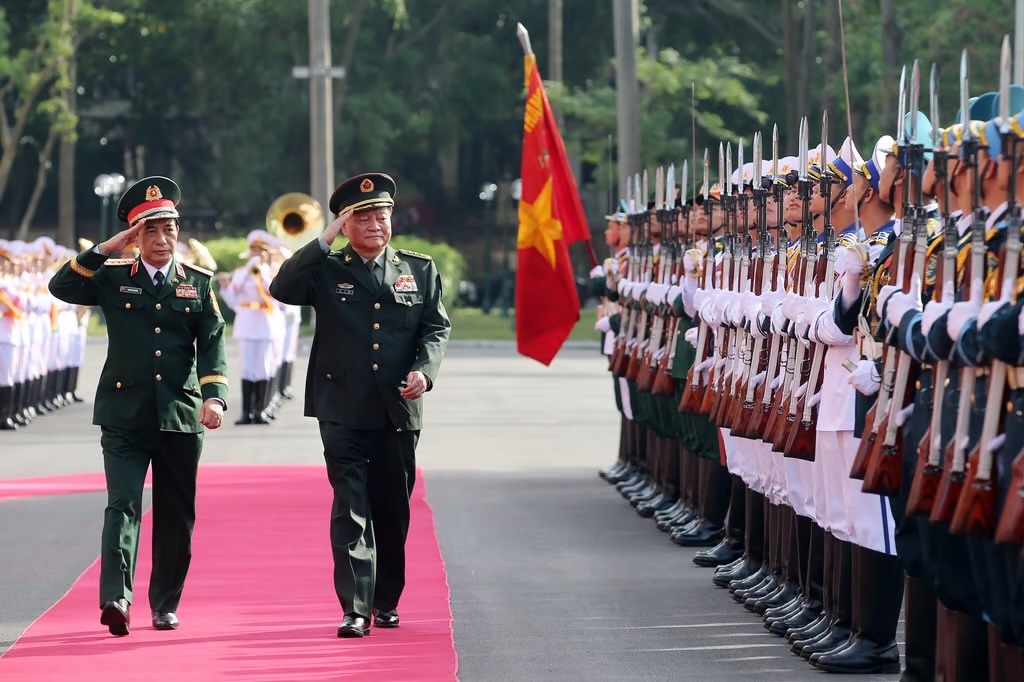China is moving closer to Vietnam in a push to improve relations and manage conflicts in the South China Sea. Last week, General Zhang Youxia, China’s top military official, visited Hanoi, Vietnam’s capital, to meet with Vietnam’s key leaders. This trip highlights China’s efforts to build stronger connections with Vietnam, potentially creating a model for managing disputes with other nations.
A Visit to Deepen Relations
General Zhang’s visit marked a significant moment in China-Vietnam relations. During his trip, Zhang met with Vietnam’s Communist Party leader To Lam, the president Luong Cuong, and senior defense officials. Both sides shared a goal to strengthen political, economic, and military ties. This commitment also led to a new agreement aimed at enhancing defense cooperation. This deal could make their military communication more effective and reduce misunderstandings over their conflicting claims in the South China Sea.
China- Vietnam: Growing Alliance
China and Vietnam have had their share of conflicts, particularly over territories in the South China Sea. China is taking steps to ease tensions with its neighbour. Zhang’s recent trip to Hanoi is one of several exchanges that show a warming relationship between the two countries. Notably, Admiral Dong Jun, China’s defense minister, also visited Vietnam earlier this year. During that visit, both sides agreed to set up a hotline between the Chinese navy and the Vietnamese navy. This direct line aims to handle any conflicts or misunderstandings in real-time, especially in disputed waters.
Vietnam’s Protest against China’s Aggressive Actions in the South China Sea
Managing the South China Sea Dispute
The South China Sea is a rich and strategically crucial area. It holds valuable resources and is a vital route for international trade. China, Vietnam, the Philippines, and other nations all claim parts of it, leading to longstanding conflicts. In 2016, an international court ruled against China’s sweeping claims in the area, but China rejected this decision. Despite the ruling, China has often clashed with nations like the Philippines. However, Beijing has recently shifted its approach to work more collaboratively with Vietnam, seeing it as a strong partner in the region.
Could Vietnam Be a Model?
China’s decision to strengthen ties with Vietnam could offer a pathway for handling disputes with other countries. By building “friendly and good neighborly” relations with Vietnam, China hopes to show that conflicts can be managed without confrontation. Some experts think this approach could help prevent issues from escalating and keep peace in the region.
With Vietnam’s influence in the Association of Southeast Asian Nations (ASEAN), and its powerful military, China sees Vietnam as a valuable ally. The United States also values Vietnam as a strategic partner, as shown by recent high-level meetings and agreements between the two nations. Both the U.S. and China view Vietnam as a key player in balancing regional powers.
Vietnam- U.S Continue to Overcome War Legacies While Expanding Partnership in Indo-Pacific
A Balancing Act in Southeast Asia
China’s new focus on Vietnam may also be part of a broader strategy. By creating a stronger relationship with Hanoi, China could reduce the chances of Vietnam joining with other countries against it. This approach may help China “divide and conquer” in the region, managing each country separately rather than facing a united front. With growing tensions between China and the Philippines, China’s cooperation with Vietnam could help prevent Vietnam from siding with the Philippines on critical issues.
Vietnam -China Cooperation Beyond Conflict
China and Vietnam have worked together on various fronts in recent years, from joint naval patrols in the Gulf of Tonkin to increased coast guard cooperation. These initiatives help both countries manage shared waters and reduce the chances of conflict. In August, the Philippine and Vietnamese coast guards even conducted joint drills, showing their dedication to working together despite regional tensions. This cooperation highlights a possible way forward for maintaining stability in the South China Sea.
Seeking Control Without Confrontation
The latest agreement between China and Vietnam could be a step toward resolving regional disputes peacefully. By creating strong ties with Vietnam, China may reduce the likelihood of future clashes in the South China Sea. For instance, one recent conflict involved Vietnam accusing Chinese personnel of attacking its fishermen. Beijing denied the incident, but such issues highlight the tension over the contested Paracel Islands.
Some analysts believe that by focusing on a cooperative relationship with, China can achieve its strategic goals in the South China Sea without direct confrontation. With strengthened ties, China may reduce Vietnam’s incentive to support other nations, like the Philippines, in disputes with China.
China’s recent moves signal a calculated approach to managing its interests in Southeast Asia. By building stronger relations China could be aiming to avoid direct conflicts while maintaining control over critical areas. For now, China and Vietnam’s efforts to increase cooperation seem to offer a promising way forward in the complex and contested South China Sea.
As both countries continue to work together on defense and diplomatic efforts, the world will be watching to see if their partnership can ease tensions in one of the world’s busiest and most disputed sea route.

